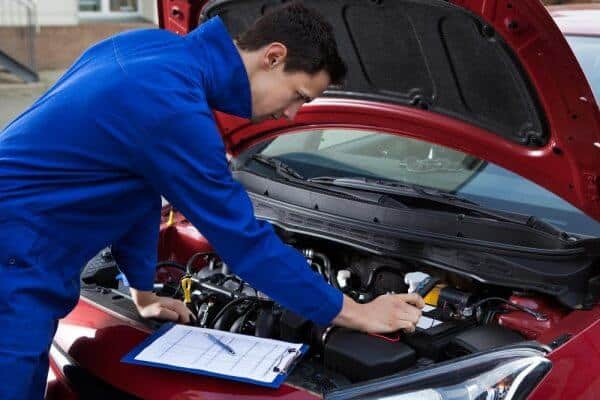Many new and experienced vehicle owners have trouble determining how much it costs to own their vehicle, which can cause significant financial strain. Regular monthly payments and scheduled car maintenance tasks are only part of the budgeting equation. Here’s everything you need to understand about the true costs of owning a car.

Source: Nestor Rizhniak/ Shutterstock.com
Purchasing a New or Used Car
You need to look at more than the vehicle cost when deciding to purchase a new or used car. Ongoing maintenance and insurance costs can impact how much you spend on your vehicle each year. New vehicles are more expensive. However, they can offer owners savings on insurance due to new safety features. You also spend less on maintenance for the first several years you own a new vehicle, and repairs are typically covered by your warranty, which extends for 36 months on average.
Those looking to purchase a car on a budget might choose used cars. These offer a lower upfront cost, even if the vehicle is just a few years old. However, used cars may not have the protection of a manufacturer’s warranty. You might get stuck with expensive repairs or even a car that doesn’t run after a few months. When buying a used vehicle, you should have it professionally inspected and check the vehicle history report to avoid running into major issues after purchase.
Hidden Costs and Fees of Buying a Car
When you purchase a new car, you aren’t simply paying the sticker price. There are numerous hidden costs and fees that could result in you paying hundreds more than you anticipated. The sticker price represents the car’s base model. Any upgrades to mats, trim, seats, engine performance features, or integrated tech increase the invoice price. Dealers also typically offer additional extras, such as an extended warranty or paint protection, for a hefty fee. Some dealerships can also charge you a documentation fee for completing all the auto paperwork; fortunately, many states place a cap on these fees.
Before driving out of the dealership with your new vehicle, you also need to pay the title and registration fees. Title documentation and fees transfer ownership of the car into your name, and registration ensures that your car is road-legal and provides you with new license plates. Finally, most states levy sales tax on auto purchases, excluding Delaware, Oregon, New Hampshire, and Montana. Depending on where you live, sales tax can range from 3%-11.5% of the car’s total price.

Source: wavebreakmedia/ Shutterstock.com
Financing Fees
The average initial sticker price of a new vehicle is over $40,000. Many people finance the purchase through an auto loan, allowing them to pay off the car in manageable monthly installments. However, depending on the length of your loan, you could end up paying significantly more than the purchase price due to the interest that accrues.
Fuel Expenses
Fuel is the most frequently incurred cost of owning a car. How much fuel your car needs depends on your driving habits, the size of the vehicle you own, and its fuel efficiency. Where you live also significantly impacts the price you’ll pay for gas at the pump.
On average, American car owners pay about 11.6 cents per mile for fuel. The average number of miles driven each year is around 13,500. This means most people are spending $125 on gas each month. If you own a hybrid or all-electric vehicle, you’ll have significantly reduced fuel expenses. However, you still pay to charge your vehicle. On average, electric vehicle owners spend just over $500 per year to charge their cars.
Annual Inspection Fees
In some states, including Georgia, Massachusetts, New Hampshire, New York, and Vermont, you are required to submit your car for annual safety and emissions inspections. Other states, such as Louisiana, Maine, Nevada, North Carolina, Pennsylvania, Tennessee, Texas, and Virginia, require safety inspections each year but only have mandatory emissions testing in certain cities.
These compulsory inspections incur a small fee. The rates vary according to your location but can range from $10-$79 (Indiana and Wisconsin offer free testing.) Some areas offer emissions and safety testing as part of your registration fee. Check your local DMV or Department of Public Safety for information on the exact fee amounts.
Property Tax
Depending on your state or municipality, you may need to pay property or excise tax on your car every year. The amount is estimated based on the value of your vehicle and the location in which it is parked as of January 1st of that year. For example, in Boston, the tax is $25 for every $1,000 of the car’s value. The Massachusetts Registry of Motor Vehicles determines the car’s value. Whereas, in Virginia, the rate is $4.57 per $100 of assessed value.
Insurance Costs
Car insurance is a significant expense for most vehicle owners, with an average cost of $1,674 per year. Your state has laws that dictate what type of insurance and how much coverage you need to legally drive. While this restricts your options, it doesn’t prevent you from shopping for a deal on car insurance. Your auto insurance rate is affected by your age, the type of car you drive, and your past driving history. If you have previous accidents or past tickets for traffic violations, expect to pay more.
Your car insurance rate is also affected by the deductible on your policy. A higher deductible can reduce your monthly payments, but you will need to pay more out of pocket if you are ever in an accident. Before changing the deductible on your auto insurance policy, make sure you have enough money saved to cover the entire deductible.

Source: Andrey_Popov/ Shutterstock.com
Regular Maintenance
Your car needs regular maintenance to keep it running smoothly. If you are mechanically inclined, you may be able to do some maintenance tasks, such as changing the oil and topping up the fluids yourself to save money.
The climate where you live can affect your average maintenance costs. Harsh weather can cause more wear and tear to vehicles. You can reduce the damage done by the elements by regularly using a car cover to protect your vehicle whenever it’s parked outdoors. The breathable cover fabric helps your car dry out, preventing rust from damaging the frame. Opt for a UV-resistant cover that reflects the sun’s rays and prevents your paintwork from fading and the car’s interior from overheating.
Your tires need to be replaced as part of your car’s regular maintenance schedule. How long tires last on your vehicle depends on the number of miles you drive each year. You should plan on replacing your tires at least every six years. On average, maintenance costs car owners $900 annually.
Take Control of Your Car Budget
Car ownership can come with a hefty price tag. Once you understand the costs of owning a car, you can take control of your budget and manage your expenses. Protecting your car with a custom cover and taking it in for regular maintenance can help your car perform optimally while reducing your annual automotive expenses.
 Gearfuse Technology, Science, Culture & More
Gearfuse Technology, Science, Culture & More


